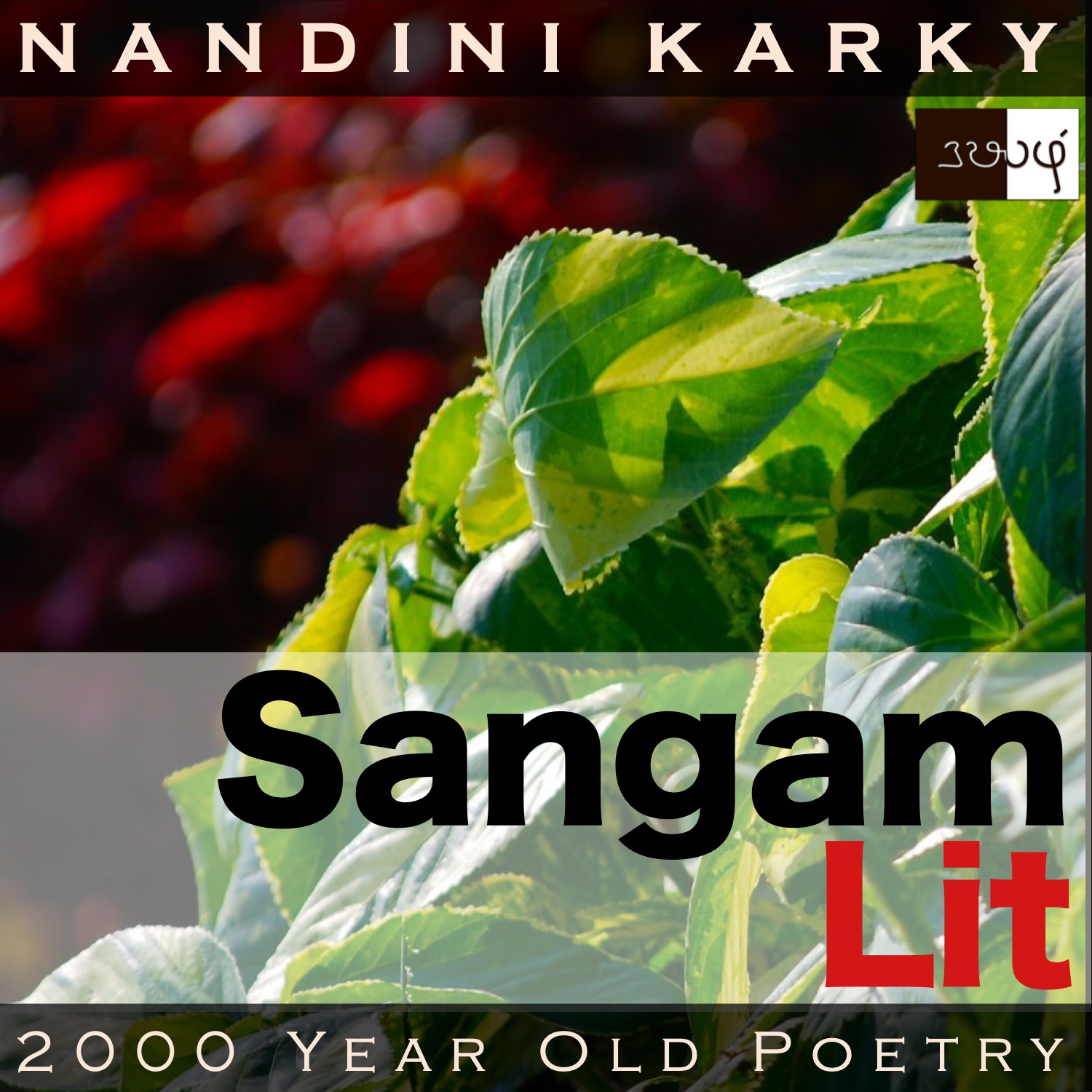Podcast: Play in new window | Download
Subscribe: Apple Podcasts | Spotify | Amazon Music | Android | iHeartRadio | TuneIn | RSS | More

In this episode, we perceive the analysis of a dilemma, as depicted in Sangam Literary work, Natrinai 359, penned by Kabilar. Set in the mountains of ‘Kurinji’, the verse speaks in the voice of the confidante to the lady, attempting to read her friend’s mind.
சிலம்பின் மேய்ந்த சிறு கோட்டுச் சேதா
அலங்கு குலைக் காந்தள் தீண்டி, தாது உக,
கன்று தாய் மருளும் குன்ற நாடன்
உடுக்கும் தழை தந்தனனே; யாம் அஃது
உடுப்பின், யாய் அஞ்சுதுமே; கொடுப்பின்,
கேளுடைக் கேடு அஞ்சுதுமே; ஆயிடை
வாடலகொல்லோ தாமே-அவன் மலைப்
போருடை வருடையும் பாயா,
சூருடை அடுக்கத்த கொயற்கு அருந் தழையே?
The verse opens with the alliteratively alluring words ‘சிலம்பின் மேய்ந்த சிறு கோட்டுச் சேதா’ meaning ‘the reddish-brown cow with small horns, which grazes in the mountain slopes’. The ancients seemed to have loved the plants and animals equally for if there’s a mention of one, shortly the other will follow. Here, we see ‘அலங்கு குலைக் காந்தள்’ or ‘the dancing clusters of the flame-lily’, that vivid-red mountain flower! The phrase ‘உடுக்கும் தழை தந்தனனே’ meaning ‘he gave leaves to wear’ establishes the central message of this verse. Another animal of the mountain country greets us in ‘போருடை வருடை’ meaning ‘fighting goats’, bringing before our eyes, the rugged mountain goats of the Western Ghats. Ending with ‘கொயற்கு அருந் தழையே’ meaning ‘hard-to-pluck leaves’, the verse extends us, a leaf bouquet. Before we accept the invite and step into the meaning of the verse, a moment to celebrate the drumbeat-like rhythm in the words ‘கேளுடை – ஆயிடை – போருடை – வருடை – சூருடை’ throbbing in the verse!
The man had met the lady in the mountain country and fallen in love with her. The lady also reciprocated his feelings. As was custom, he had to win the confidence of the lady’s confidante to further his relationship with the lady. After many attempts, he achieves this. However, the lady has still not opened her heart to her friend. So, one day, the confidante says to the lady, “A short-horned, reddish-brown cow that grazes in the mountain slopes brushes against the swaying flower clusters of the flame-lily and so, gets coated in the pollen of the flowers, making its own calf confused looking at its mother. Such are the scenes in the lord’s mountain peak. He came and handed over leaves to be worn. If we decide to wear it, fear about mother arises; If we decide to return it, fear about hurting his affectionate heart arises. So, should we just let these leaves wither? These precious, hard-to-be-plucked leaves that came from such places in his mountains, where even warring goats leap not and where mountain spirits reside!” With these words, she conveys the determination of the man and instigates the lady to reveal the truth in her heart.
Now, for the nuances! The confidante arrives into the scene bearing a bunch of leaves, and when we look up quizzically at her, she gives no explanation immediately and instead narrates to the lady, a scene from the mountains. Here, a rust-coloured cow is seen grazing on the mountain slopes, which were thickly populated with flame-lily bushes. As it went about eating, the pollen from the flowers got entangled in its fur. Learnt that although the flame-lily is red, it produces large quantities of pollen, yellow in colour. So, we can imagine this cow, almost changing colour from red to yellow. When the young one of this cow takes a look, it quivers in confusion, not identifying its own mother. The confidante narrates this scene as if only to describe the man’s mountain country and then says that the leaves in her hand came from the man. He had offered it as a token of his love to the lady and had sent the confidante as his messenger.
After clarifying who the leaves came from, the confidante describes the difficulty in the situation. If the lady were to happily accept it, mother might wonder about how she got those leaves. Why, couldn’t the lady have picked it from their mountain slopes? Let’s hold on to the question and listen to what the confidante has to say. She continues by saying that if they were to return it to the man, he would be hurt at the refusal of his gift. Then, she looks at the leaves and with a sad expression asks, in all this delay, how can they let the leaves wilt away? She emphasises how these leaves are found only in the hard-to-reach nooks of the man’s mountain land, where even those mountain goats go not and where the mountain spirits live. Such is the divine and rare nature of those leaves, the confidante stresses! Now, we understand mother’s confusion because those leaves are not to be found anywhere in their mountains. Rewinding to the scene of the calf being confused by its mother’s appearance, the confidante situates a metaphor of how the lady, being covered in her innate shyness, makes it difficult for the confidante to perceive the truth about the lady’s feelings for the man. Here, she places a hidden request that the lady come clean about it. Whether the lady dressed herself in those remarkable leaves, whether she braved mother’s questions to wear that gift of love are facets that lie hidden in the mists of the past’s imagination. But, what emerges in bold hues is the elegant consideration of the pros and cons in a dilemma and its inevitable consequence!




Share your thoughts...